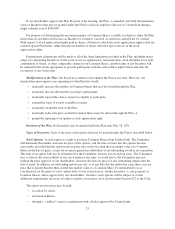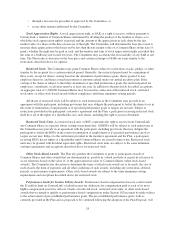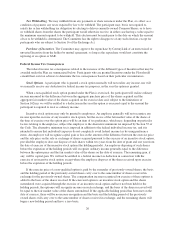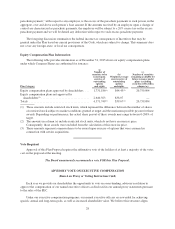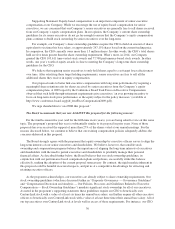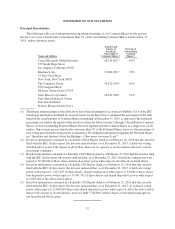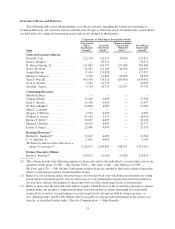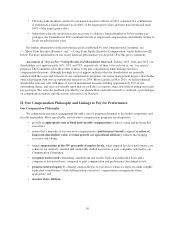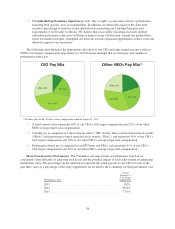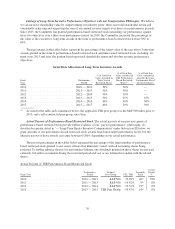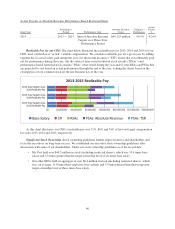CenturyLink 2015 Annual Report Download - page 42
Download and view the complete annual report
Please find page 42 of the 2015 CenturyLink annual report below. You can navigate through the pages in the report by either clicking on the pages listed below, or by using the keyword search tool below to find specific information within the annual report.currently holds stock valued at over 35 times his current salary. We believe that our stock ownership guidelines
accomplish the proponent’s intended purpose of aligning executive and shareholder interests through at-risk
equity ownership.
Our executive compensation plans and policies are carefully designed to further align the long-term interests
of our senior executives and shareholders. Typically, a substantial majority of our annual executive compensation
consists of awards of time-vested restricted stock that vests over a three-year period and performance-based
restricted stock that vests only if we achieve our three-year threshold levels of targeted performance. As such, the
value realized upon vesting of our restricted stock is directly tied to our long-term performance and the
appreciation of our stock price over the vesting period, which benefits all shareholders. In addition, we have
implemented both anti-hedging and anti-pledging policies to ensure that our executives bear the full economic
risk and reward of their stock ownership, and that their economic interests remain fully aligned with the
economic interests of our other shareholders. We also have implemented recoupment policies designed to further
assure a linkage between our executive compensation and our long-term performance.
Adoption of the proponent’s proposal could be harmful in several respects. While it is essential that our
executive officers have a meaningful equity stake in our Company, the Board also believes that it is important
that we do not prevent them from being able to responsibly manage their personal financial affairs. The adoption
of this policy would limit our executive officers’ abilities to engage in customary and prudent estate planning,
portfolio diversification or charitable giving. Worse yet, these onerous restrictions could create an incentive for
senior executives to resign in order to realize the value of their prior service. We believe that the type of retention
policy described in this proposal is, not surprisingly, uncommon among our peers and that the adoption of this
proposal would put us at a competitive disadvantage relative to our peers who do not have such restrictions.
We believe that our guidelines, plans and policies are better balanced than the proponent’s proposal. We
believe our Compensation Committee of independent directors is best suited to formulate compensation
programs that discourage excessive risk-taking and promote long-term, sustainable value creation. We further
believe that the Committee should continue to have the flexibility to structure effective and competitive
compensation programs that attain these goals. We believe that our current mix of guidelines, plans and policies
provide for an appropriate balance between aligning the long-term interests of management and the shareholders,
while also permitting our executives to prudently manage their own affairs.
For all these reasons, our Board believes this proposal is unnecessary and undesirable, and contrary to your
best interests.
31




